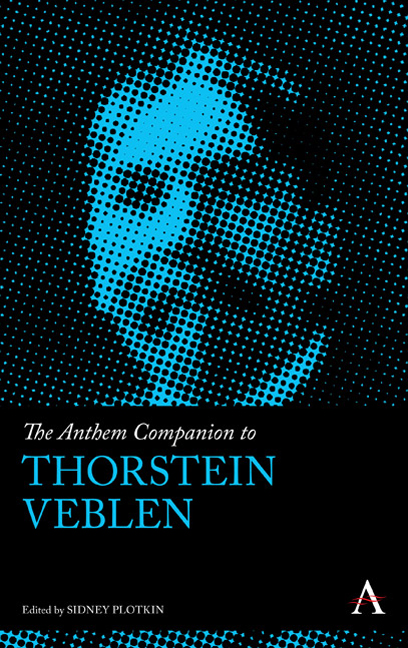Book contents
- Frontmatter
- Dedication
- Contents
- Acknowledgments
- Introduction: Thorstein Veblen's Elusive Project
- Part I METHOD, PHILOSOPHY AND VALUES
- Contents
- Chapter One The Instinct of Workmanship and Other Philosophical Concepts in Thorstein Veblen's Methodology
- Chapter Two Reconsidering Thorstein Veblen's Use of Instincts
- Chapter Three Roman Catholic Critics of Thorstein Veblen and Institutional Economists
- Chapter Four The Metaphysical World of Thorstein Veblen: Of and Beyond the Here and Now
- Chapter Five Veblen's Position on Education Analyzed and Reformulated
- Part II CAPITALISM, SOCIAL STRUCTURE AND POLITICS
- List of Contributors
- Index
Chapter Three - Roman Catholic Critics of Thorstein Veblen and Institutional Economists
from Contents
Published online by Cambridge University Press: 10 January 2018
- Frontmatter
- Dedication
- Contents
- Acknowledgments
- Introduction: Thorstein Veblen's Elusive Project
- Part I METHOD, PHILOSOPHY AND VALUES
- Contents
- Chapter One The Instinct of Workmanship and Other Philosophical Concepts in Thorstein Veblen's Methodology
- Chapter Two Reconsidering Thorstein Veblen's Use of Instincts
- Chapter Three Roman Catholic Critics of Thorstein Veblen and Institutional Economists
- Chapter Four The Metaphysical World of Thorstein Veblen: Of and Beyond the Here and Now
- Chapter Five Veblen's Position on Education Analyzed and Reformulated
- Part II CAPITALISM, SOCIAL STRUCTURE AND POLITICS
- List of Contributors
- Index
Summary
Introduction
Before we deal with Thorstein Veblen's exchanges with his Roman Catholic opponents, we would like to briefly outline his own philosophy in part by explaining his work and then using comments made by other American philosophers about the meaning of evolutionary naturalism. The roots of modern naturalism lie deep in the past. As Veblen sardonically put it,
Philosophy— the avowed body of theoretical science in the late medieval time— had grown out of the schoolmen's speculations in theology, being in point of derivation a body of refinements on the divine scheme of salvation; and with a view to quiet title, and to make manifest their devotion to the greater good of eschatological expediency, those ingenious speculators were content to proclaim that their philosophy is the handmaid of theology— Philosophia theologia ancillans. But their philosophy has fallen in to the alembic of idle curiosity and has given rise to a body of modern science, godless and unpractical, that has no intended or even ostensible bearing on the religious fortunes of mankind; and their sanctimonious maxim would today be better accepted as the subject of a limerick than of a homily.
Veblen was thus well aware of the effects of cultural retardation on the human intellect as well as the persistence of atavistic continuities. In a related vein, a leading American naturalist philosopher, Peter Hare, writes,
For American naturalists, nature consists of everything there is. Nothing is “outside” nature. Whatever exists is no more or less an aspect of nature than anything else. Furthermore, nature is, to one degree or another, objective, which means that it has characteristics the content of which is not determined by our opinions of them— nature may be studied and known. Crucially, human beings are part of that knowable nature. American naturalists reject any dichotomy between nature and human being. Human life, including its purposes, goals, meanings, values, and ideals, is wholly natural.
Our search continues for an adequate definition of American naturalism to better understand Veblen's own philosophy.
- Type
- Chapter
- Information
- The Anthem Companion to Thorstein Veblen , pp. 69 - 100Publisher: Anthem PressPrint publication year: 2017



